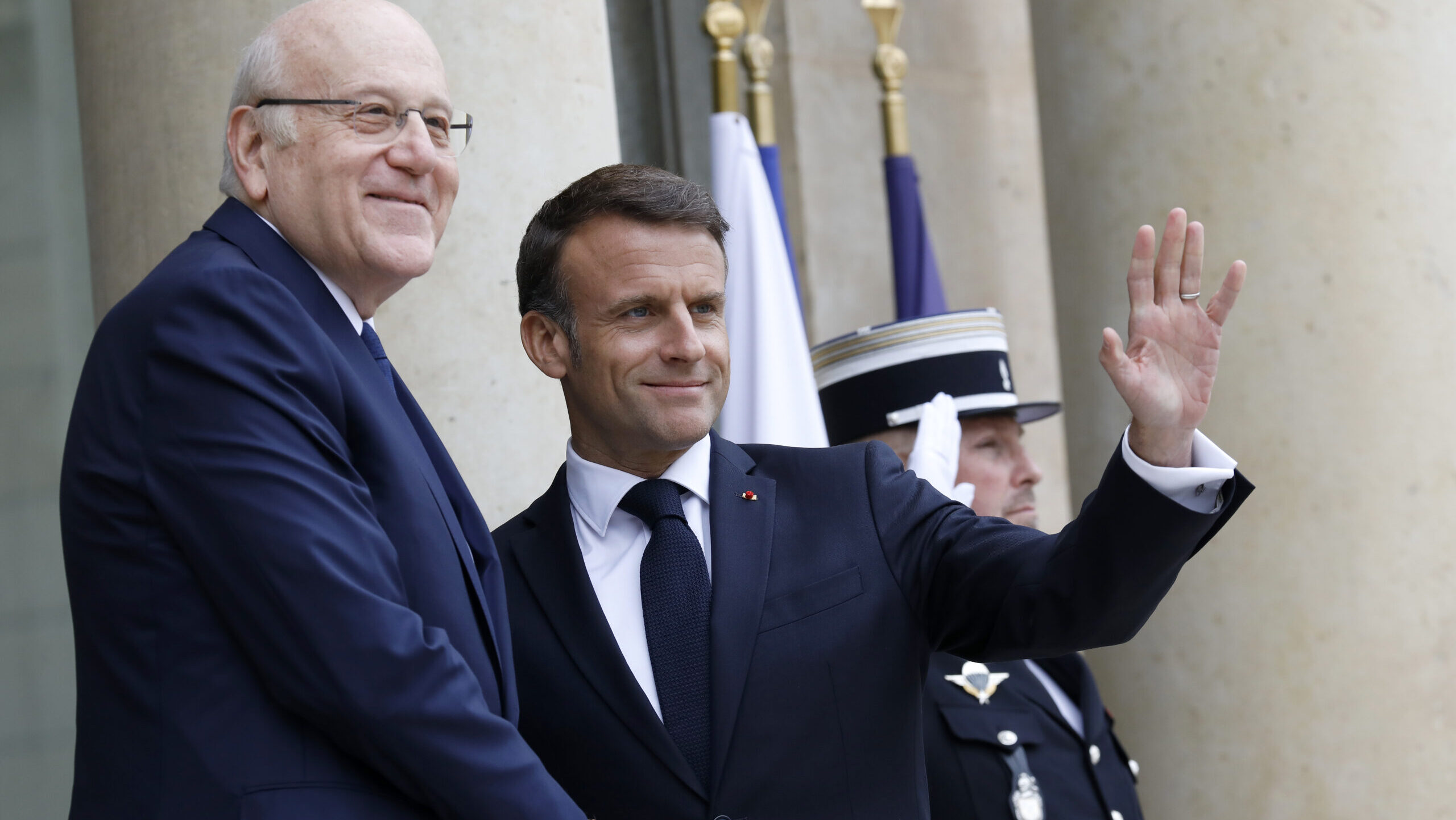French-Led Effort Aims To Disarm Hizbullah, Restore Peace at Israeli Border
Experts believe that an agreement to achieve Hizbullah's withdrawal will only be successful as a result of international discussions, including Iran
French President Emmanuel Macron held talks on Friday with Lebanese Prime Minister Najib Mikati and the country’s army chief, Joseph Aoun, at the presidential Elysee Palace in Paris. The agenda focused on addressing the cross-border clashes between Hizbullah in southern Lebanon and Israel, alongside finding solutions to the persistent political impasse in Lebanon.
Mikati’s office statement cited discussions with Macron regarding a French initiative to cease cross-border hostilities. The proposal entails bolstered assistance for the Lebanese army and the withdrawal of Hizbullah from areas within 10 kilometers (six miles) of Lebanon’s border with Israel.
According to Romy Nasr, a security and extremism analyst covering the Middle East and North Africa, the Lebanese government wants to implement this withdrawal and is pushing for it through diplomatic channels and private talks with Hizbullah’s interlocutors. However, she believes that the government’s will to do so is not enough to get Hizbullah to withdraw.
“They [the Lebanese government] are keen on preserving Lebanon’s government power in deciding whether they engage, as well as the level of engagement in any war. Such a decision should not be in Hizbulllah’s hands,” she said.
At the same time, she noted that Hizbullah did not get the green light from the Lebanese government to start engaging in the ongoing war of attrition with Israel on the southern border.
“Why would they agree to withdraw?” Nasr questioned, noting that as a response to the French plan, Hizbullah’s deputy, Naim Qassem, stated on Saturday: “There is no withdrawal from the confrontation, and no retreat from support for and protection of Gaza.”
Mohamad Radwan Al Omar, president of the Lebanese Assembly for Inclusive Development and representative adviser to Lebanon for MediateGuru’s Global Advisory Board, told The Media Line that while the Lebanese army lacks advanced armament and equipment, Hizbullah has plenty. This imbalance is preventing the army from prevailing over Hizbullah in southern Lebanon.
“The Lebanese army has been offered advanced weapons and equipment multiple times, but the offers were declined due to the need for a high budget for maintenance and the corruption prevailing inside the Lebanese government,” he said.
In addition, Al Omar noted how, according to the Taif Agreement, Hizbullah was the only group in Lebanon that was exempted from being disarmed, allowing it to continue to carry heavy weaponry and to expand.
The Taif Agreement, also known as the National Reconciliation Agreement, signed in 1989, ended the 15-year-long Lebanese civil war. The treaty, negotiated in Taif, Saudi Arabia, consisted of a constitutional reform that intended to restore peace in war-torn Lebanon. The agreement commanded that all militias in Lebanon be dismantled and give up their weapons. However, Hizbullah did not consider itself a militia and argued that it still had a part in “liberating the territory,” as the Israeli army was still present in southern Lebanon. Therefore, Hizbullah was exempted from giving up its weapons.
“Lebanon’s government is weak right now, so enforcing the [French] plan could be tricky. While the French plan offers a path toward a truce, it’s a tough road. Convincing both Hizbullah and Israel will be a major challenge,” said Al Omar.
According to Nasr, Hizbullah will only withdraw from Lebanon’s southern border as a result of international power dynamics and negotiations, namely between the US government and Iran. “The latest events have shown the close coordination between both countries,” she said, referring to the mild effect of the Iranian retaliation against Israel’s attack in Damascus, which killed several Iranian Revolutionary Guard Corps officials.
“Iran’s support of Gaza is a priority. However, it does not precede the importance of preserving all negotiations around the nuclear program in Iran,” Nasr continued.
She argued that while France’s rush to support the Lebanese army may de-escalate tensions at the southern border, this fully depends on whether such a move will receive strong support from Washington and the international community.
“France is speaking directly to the US about this because it is concerned with preserving Lebanon’s stability. It is no secret that the US controls the Israeli decision in this regard, and, therefore, there is no need to directly speak to Israel as long as the issue goes back to Washington,” she said.
Al Omar explained that Paris’ persistence in bringing stability to Lebanon is due to several reasons. “Lebanon and France have a long and complicated history,” he said, noting that France played a big role in shaping Lebanon after World War I and that the French influence is still felt in the language and some government structures. He added that France’s colonial past in Lebanon creates a sense of responsibility, and a stable Lebanon reflects well on France’s legacy in the region.
Today, Al Omar continued, “France remains a close ally, providing political and military support to the Lebanese government. However, Lebanon is an independent country, and France can’t dictate what happens there.”
Powerful groups like Hizbullah limit French influence, he explained, adding that in light of the situation, Paris works with other countries to try and manage the conflict through diplomatic channels.
From France’s geopolitical perspective, Al Omar said, stability in Lebanon is in their best interest. An unstable Lebanon can easily destabilize its neighbors, which would be a security concern for France, given its stake in the wider Middle East. “Lebanon’s proximity to war-torn Syria is a prime example of this domino effect,” he said, noting that a stable and France-friendly Lebanon allows Paris to maintain its influence on the region’s political scene, acting as a counterweight to other powers.
From an economic point of view, a peaceful Lebanon presents economic opportunities for French companies. “Imagine French firms being involved in rebuilding infrastructure or developing new industries after a period of calm—that would be a lucrative prospect,” Al Omar concluded.

